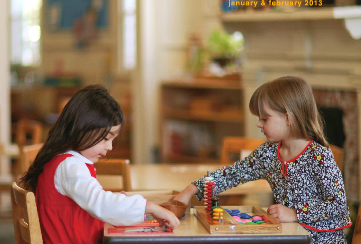
Alternative Educations Growing Popularity
As three alternatives to traditional early childhood and elementary education—Reggio Emilia, Montessori, and Waldorf–grow in popularity in New Orleans, their offerings also increase.
Reggio Emilia
Among other things, Reggio Emilia fosters a great sense of community and lets young children learn from their participation in the environment. The Abeona House offers a Reggio Emilia-inspired preschool that focuses on nourishing children’s minds and bodies through mutual respect and a spirit of discovery. At St. George’s Episcopal Preschool, teachers are inspired by the project-based approach of the Reggio-Emilia model. And for the past several years, Louise S. McGehee’s Little Gate has immersed itself in the Reggio Emilia approach, sending several of its faculty to North American Reggio Emilia Alliance conferences, school visits and workshops to further their commitment to the early education approach. More information on the Reggio Approach.
Montessori
Other alternative education programs, Montessori and Waldorf schools, include early education but also reach beyond kindergarten. Montessori schools offer an education based on the studies of Dr. Maria Montessori and encourage students to select their own activities and lessons from a number of options so that each child follows his or her own unique curriculum. Except for Audubon Charter (a public charter which goes through eighth grade), all Montessori-affiliated schools in New Orleans end with kindergarten. Cathedral Montessori plans to change that.
“Most major cities have numerous Montessori schools from which to choose, both public and private, that extend to middle and even the high school years,” says Jan Weiner, director of Cathedral Montessori School. “We hope to expand through the elementary years to provide an additional choice to the families in our community.”
Jan says that since her school opened in 2010, parents have asked her to expand to lower elementary grades.
“
Once they get a taste of the Montessori curriculum, where their children have developed a love of learning through a developmentally appropriate, hands-on learning environment,” she explains, “they are reluctant to enroll their children in a curriculum that may be largely a pencil and paper method.”
The school is pushing forward with plans to expand to teach those up through age nine. Jan says that eventually, they will expand to “upper elementary”—through sixth grade. She
sees the future lower and upper elementary classrooms as a continuation of the Montessori “learning by doing” approach that’s currently used for the three-to-six year olds. Students will become “increasingly more self-directed as they plan their academic choices for each day and are actively involved and responsible for meeting their goals,” she says. More information on the Montesori method.
Waldorf
The Waldorf School, in the Irish Channel, teaches children from age two through eighth grade. A member of the Waldorf Early Childhood Association of North America, it focuses on the “whole” child—body, mind and spirit. Teachers typically stay with the same group of students over multiple years at the school. Classes are structured to meet children where they are, academically and socially, and teachers focus on creating an exciting and visually stimulating environment for their students.
Whatever style of alternative education approach you may choose for your child—Reggio Emilia, Montessori or Waldorf—when it comes time to move onto a more traditional school, students typically fair very well. It’s not just that they’ve learned advanced concepts ahead of the peers; they’ve also developed their creativity, compassion, and confidence. More information on the Waldorf Method.
Interested in learning more about the different educational options in New Orleans? Read our article here.

